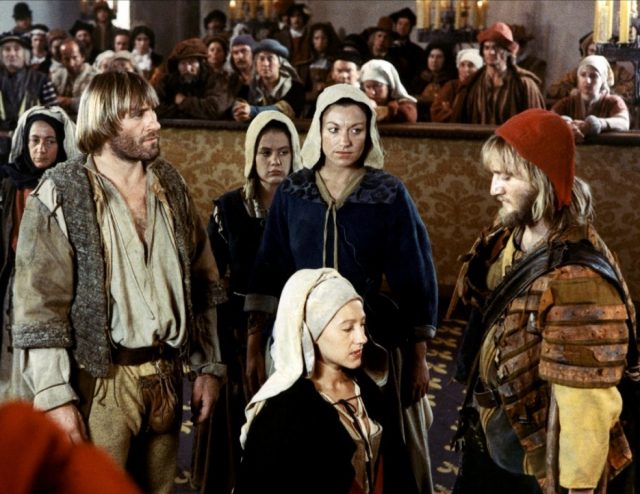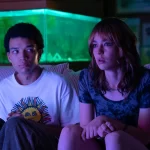The Return of Martin Guerre: Don’t Act a Fool, by David Bax

Daniel Vigne’s The Return of Martin Guerre, recently restored and returning to theaters, starts by introducing the viewer to a mystery. The film opens in media res (it’s from 1982, before every movie did that) with Bertrande (Nathalie Baye) being questioned by a judge (Roger Planchon) about her husband. Vigne and his co-screenwriters, adapting a book by Janet Lewis, aren’t really interested in drawing out the suspense, though. In fact, fascinatingly, mystery is just one of the genres this film cycles through, despite being based on true events.
It’s the mid-16th century and, in the small French village of Arigat, Martin Guerre and Bertrande de Rols have just been wed. The happy couple aren’t happy for long, though. With difficulty conceiving children and Martin’s foul moods, their marriage is troubled from the start. But they do eventually produce a son. And, shortly thereafter, Martin disappears with no explanation. Nearly a decade later, a man claiming to be Martin Guerre (Gérard Depardieu) shows up and, before long, reingratiates himself to the village. He works the land, the townsfolk accept him and, most importantly, Bertrande (Nathalie Baye) is happy to have her husband back, more caring and loving than he ever was before.
Vigne initially approaches the story as if it’s a folk tale, treating the returned Martin as a sort of Rip Van Winkle figure. There’s a storybook magic to much of the first half of the film. The village’s warmth and the love between Martin and Bertrande are infectiously outsized. That begins to change, though, when some wandering soldiers, looking for food and shelter, recognize Martin but call him by a different name. With Martin’s uncle, Pierre (Maurice Barrier), convinced that the new Martin’s a charlatan, The Return of Martin Guerre smoothly shifts genres again, with essentially its entire second half taking the form of a medieval courtroom drama. In Pierre, we also get a lesson about how being overzealous–even if you’re right–can make you look desperate and suspicious.
The Return of Martin Guerre is a tremendously well-cast film. Barrier as the righteously seething antagonist; Planchon as the impartial yet compassionate judge; even Jean-Pierre Jeunet mainstay Dominique Pinon shows up playing a village goofball in the way only he can. All are outstanding
Emotionally, though, it’s Baye who carries the film. Vigne often privileges Bertrande’s point of view, despite her having nowhere near as much dialogue as Depardieu’s loquacious Martin. Entire turns of narrative, with potential fallout for any number of characters, depend on the smallest change in her facial expression. An up- or down-turned lip could mean death for one person or financial ruin for another. Baye never misplays a single moment.
It’s fitting that there are so many good performances here since, in the subtext, The Return of Martin Guerre is a film about acting. Despite the fact that Vigne never gives the viewer reason to believe Depardieu’s Martin is the real Martin, the director and the actor invite you to sympathize with the characters who do. This is a man whose entire life is a performance and, while rigorous memorization is crucial to pulling it off, his ability to convince resides in something deeper–perhaps his believing his own lie, at least a little bit. I’m sure great actors like Depardieu and Baye can relate.




























